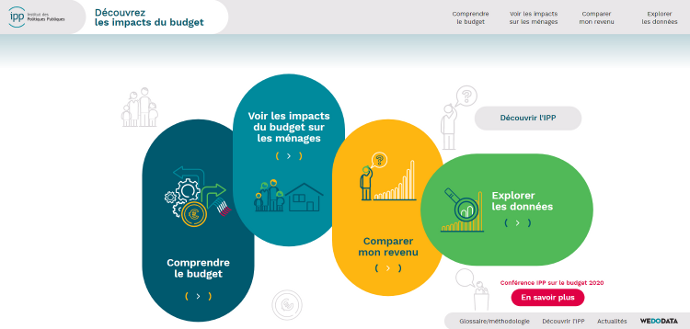15 October 2019 – What are the key statistics in this Budget? What impact will the new policies (on property tax, income tax, adjustments to benefits, etc.) have on households? What are the cumulative effects since the beginning of this government term?
The Institute for Public Policy (PSE/GENES), in accordance with its mission to inform and to teach, has now created a new web site: budget.ipp.eu where you can view, download and share dozens of free graphics and data. You can also browse the methods developed by our researchers, the main parameters of our micro-simulator and a detailed tax-benefit glossary.
– Direct access to the site budget.ipp.eu
– Access all resources associated with the 15 October conference “Evaluating the 2020 Budget”
– Press liaison: Sylvain Riffé Stern – sylvain.riffe@psemail.eu

Four elements to decipher the 2020 Budget and its effects on households
- Understand the structure of state revenue and spending
- Access our analysis and graphics about the budget’s impact on households
- Compare income by decile and household type
- Explore and download all the data generated
An informative site backed up with proven expertise
The research and evaluation work of the Institute for Public Policy (IPP) aims to encourage citizens’ understanding and use of the terms of public debate. In measuring the impact of public interventions, the goal is to contribute to a quality democratic debate.
All the results of this work are made public, as are the data that produce the results. Researchers continuously apply the most advanced quantitative methods and subject their work to rigorous academic standards. In the evaluation of budget policies, this pedagogical objective takes the form of the new web site budget.ipp.eu.
The Institute for Public Policy was created by PSE and developed in the framework of a scientific partnership between the Paris School of Economics and the Groupe des écoles nationales d’économie et de statistique (GENES). The IPP also receives support from the ANR-Agence nationale de la recherche under the Investments in the Future programme.
To learn more about the IPP, browse the Institute’s presentation booklet – visit the web site www.ipp.eu
Ce message est également disponible en :  French
French


